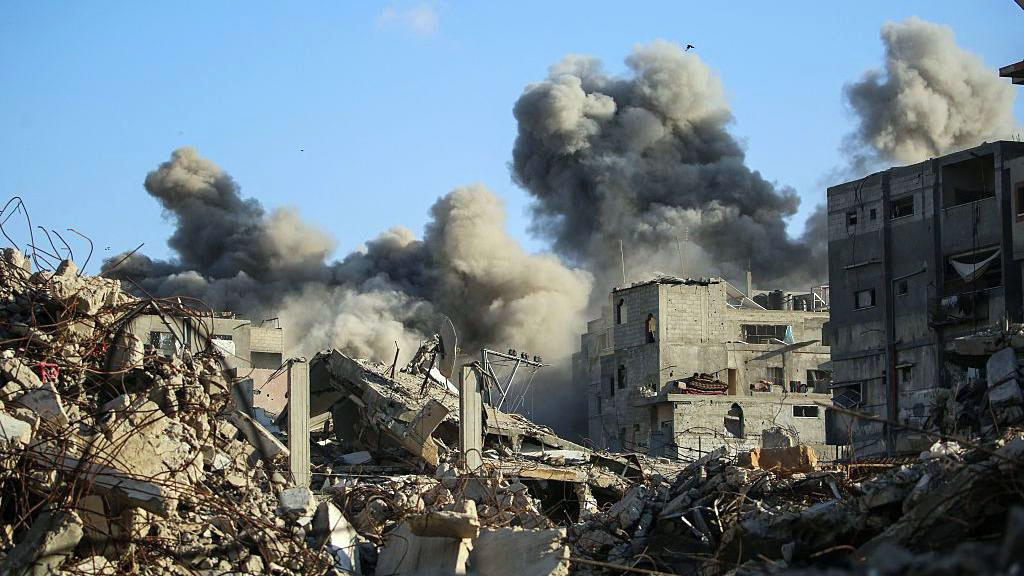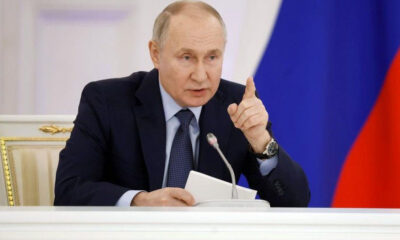International
Blinken and Austin to visit war-battered Ukraine, Zelensky says

U.S. Defense Secretary Lloyd Austin and Secretary of State Antony Blinken will visit Ukraine on Sunday, Ukrainian President Volodymyr Zelensky said, in what would be the first high-level visit by Biden administration officials since the start of the Russian invasion.
Such a trip would underscore the administration’s emboldened approach to Ukraine in recent weeks, as President Biden has committed additional billions of dollars in weapons and equipment to Ukraine’s military. The Pentagon has also announced training exercises for select groups of Ukrainian officers on U.S.-made weapons systems.
It also highlights the continued disconnect, with Ukraine continuing to step up demands for more military and financial aid and the West’s pledges. “They should not come here with empty hands,” Zelensky warned, speaking from an underground subway station in Kyiv. “We are expecting specific things and specific weapons.”
“Come to us, we’ll be happy to see you. But please bring us the assistance, which we have discussed,” the Ukrainian president added. “That’s why the visit from the U.S. is very important.”
Heavy bombardment continued in several Ukrainian cities in the east of the country over the weekend as fighting appears poised to rage straight through the country’s observance of Orthodox Easter on Sunday despite international appeals for a cease-fire over the holiday.
On Saturday, Russian missile struck Odessa, a strategic southwestern port city that has seen fewer attacks during the war. At least eight people were killed, including a 3-month-old infant, Ukrainian officials said.
READ ALSO:
- FG to Boost Crude Oil Production in Two Weeks
- FCT police raid mountains, dislodge bandits, kidnappers
- Anambra kidnappers want gun, N4m as ransom for our members, cows — Miyetti Allah
The attacks hit two residential buildings and a military facility, Ukraine’s air force said, rocking a city where life had largely returned to normal after Russia narrowed its military campaign in recent weeks to focus on the eastern regions, where Russia-backed separatists have been fighting Ukraine for several years.
Andriy Yermak, the chief of staff for Zelensky, wrote in a post on the Telegram messaging app that the number of casualties from Saturday’s barrage on Odessa is likely to rise. Zelensky later told reporters that Russian forces were “dirty scumbags” for carrying it out.
“The child was one month old when the war started,” he said. “What is even happening here?”
Two people were rescued from the rubble, and 86 were evacuated from a 16-story apartment building that was hit, Ukraine’s national emergency services office said. A video of the aftermath shared on social media and verified by The Washington Post showed large black plumes of smoke billowing from a tall building near a grassy area.
The Russian defense ministry asserted that its missile strikes had destroyed a logistics terminal in the city where foreign weapons were being stored. The Post could not independently verify that claim.
The strikes were an ominous reminder of a recent warning from a top Russian commander that forces intend to take “full control” of all of the southern port cities of Ukraine so that Russia could have a path to Ukraine’s western landlocked neighbor of Moldova, which has its own breakaway region, Transnistria, aligned with Russia. His comments were condemned by Moldova, where residents have worried since the beginning of the war they could be next in the Kremlin’s crosshairs.
The United States has allocated roughly $3.4 billion in military assistance to Ukraine since the war began in February and has intensified its shipments of weapons and equipment into the country over the past two weeks.
The donations include thousands of missiles that can be used against Russian military aircraft and artillery, long-range artillery cannons, helicopters, armored vehicles, radar defense systems, drones and anti-personnel mines, among other equipment.
The latest $800 million assistance package, announced Thursday, includes two drone systems.
But the Pentagon has remained tight-lipped about the timing and locations of its deliveries and has said that the Ukrainians control the destination of the weapons once they cross into the country.
More than two dozen nations have joined the effort to funnel military support to Ukraine since Russia’s invasion in February.
Numerous foreign dignitaries, including British Prime Minister Boris Johnson, have visited Kyiv in recent months to show their support for Zelensky’s government. He announced Saturday that Britain would reopen its embassy in Kyiv, which diplomats had evacuated at the start of the invasion.
READ ALSO:
- Tinubu, Umahi, Mohammed, Ngige, other presidential aspirants attend Aisha Buhari’s Iftar dinner
- PDP Ticket: Crack Over Northern Consensus Widens As Aspirants Insist On Primary
- Over 100 killed, vehicles razed as illegal refinery explodes in Imo
Biden last month traveled to Poland and visited with Ukrainian refugees and U.S. service members stationed there.
Austin will also be hosting a summit in Germany in the coming days to build support for Ukraine’s defense and security needs, the Pentagon’s top spokesman, John Kirby, said Thursday.
The “Ukraine Defense Consultative Group,” which will meet at Ramstein Air Base in Germany on Tuesday, will focus not just on Ukraine’s short-term military assistance needs and the latest battlefield assessments, but also take “a longer, larger view of Ukraine’s defense needs, going forward beyond the war that they’re facing right now,” Kirby said.
More than 20 countries have agreed to participate that meeting, Kirby said Friday.
But as nations including the United States dispatch heavy weaponry, some cracks are emerging in the coalition of allies. German Chancellor Olaf Scholz cautioned that it was a “top priority” for NATO to “avoid a direct military confrontation between NATO and a highly armed superpower like Russia, a nuclear power.”
In an interview with Der Spiegel published Friday, Scholz said it was not “justifiable for Germany and NATO to become parties to the war in Ukraine.”
Scholz made the comments in response to several questions about the prospect of his country’s delivering heavy weapons to help Ukraine fight Russian attacks. He noted that Germany had already provided 2 billion euros ($2.16 billion) and delivered “defensive weapons,” antitank mines and antiaircraft equipment to Kyiv.
Horrors continue to emerge each day, especially from the bombed-out port city of Mariupol. Civilians evacuated from the city in recent days spoke of bodies in the streets and shelling so relentless that venturing above ground to find water was easily a death sentence.
Russian President Vladimir Putin this week declared Russia’s victory in the battle for Mariupol, even as Ukraine said a contingent of about 1,000 Ukrainian fighters and civilians remain holed up in the steel plant. Putin said in a rare televised address that he had ordered his troops not to storm the steel plant but to blockade it “so that even a fly could not get through.”
Mariupol Mayor Vadym Boychenko on Saturday said that Russian forces had again “thwarted” a coordinated attempt to evacuate civilians from the city.
Boychenko’s office wrote on Telegram that more than 200 people had planned to board buses outside a city shopping center, to evacuate to the southeastern city of Zaporizhzhia.
That plan collapsed, Boychenko alleged, after Russian forces told some of those assembled that “there will be shelling,” and that the buses would only travel as far as Dokuchaevsk, a city currently under Russian control.
The Post was unable to independently verify this claim, or another from Ukraine’s human rights ombudsman who said this week that Russia had taken more than 300 Mariupol civilians, including 90 children, to Russia.
Evacuation plans and other efforts to establish humanitarian corridors in and out of Mariupol have routinely failed, amid relentless shelling and the Russian encirclement of the city, that has left residents largely cut off as food, water and medical supplies have dwindled.
A video released Saturday by Ukrainian forces at their last stronghold at the Azovstal Iron and Steel Works plant in Mariupol appears to show a large number of civilians living in cramped conditions in an underground bunker, including women and children.
The video, if confirmed, would be the most extensive footage to date of life in the plant, where an unspecified number of Ukrainian civilians and fighters are said to be holding out against a much larger and better-equipped Russian forces. The video could not be independently verified.
“We want to go home. We want to see the sun,” said one child in the video, standing in a cramped underground shelter with other women and children, where belongings were suspended on lines above makeshift beds.
A woman in the video said her family had been hiding there since March 2. “My husband works here. So we came here with the whole family,” she said. “Grandmother and grandfather stayed at home.”
Other cities in Ukraine also came under heavy fire. Three people were killed and more than 20 people were wounded in the city of Kharkiv and the region as a result of more than 50 strikes from Russian forces on Saturday, a Ukrainian military governor said Saturday. Oleh Syniehubov, head of the Kharkiv regional military administration, claimed that Russian forces “continue to fire on the civilian infrastructure of Kharkiv and the region.”
The United Nations’ high commissioner for human rights Michelle Bachelet this week described Russia’s military campaign in Ukraine as a “horror story of violations perpetrated against civilians,” as the international human rights monitor has documented growing evidence of war crimes, including the indiscriminate shelling of civilian areas and summary executions.
As Russia has withdrawn from northern cities near Kyiv, where earlier bombardments were heavy, the U.N. said satellite imagery has confirmed the massive destruction of civilian infrastructure there. Nearly 80 percent of the village of Horenka appeared to have been destroyed, Bachelet said.
U.N. Secretary General António Guterres is slated to meet separately with both Putin and Zelensky next week in the latest diplomatic effort to mediate an end to the fighting.
Amid the continuing siege, Zelensky said Ukraine had appealed to Pope Francis to try to help civilians stranded in Mariupol.
During the Saturday news conference, Zelensky proposed that the pope help with negotiations to try “to unblock the humanitarian corridors” into and out of the city, echoing a proposal for the pope to visit the war-torn country.
“It is too early to tell, but we are waiting for him,” Zelensky told reporters. “We are waiting because he has a mission — a mission from God. He is trusted by a large number of people; I think this is important.”
THE WASHINGTON POST
International
Israeli Airstrikes Kill 12 in Gaza as Violence Persists Despite Ceasefire

Israeli Airstrikes Kill 12 in Gaza as Violence Persists Despite Ceasefire
At least 12 Palestinians have been killed in Israeli airstrikes across the Gaza Strip, the territory’s civil defence agency reported on Sunday, marking one of the deadliest days since a fragile ceasefire was implemented. The strikes hit multiple areas, including Jabalia refugee camp in northern Gaza and the southern city of Khan Younis, leaving several others injured.
The Gaza Civil Defence, responsible for rescue and emergency operations under Hamas, said one airstrike struck a tent sheltering displaced civilians in Jabalia, killing at least five people and wounding others. Another strike in Khan Younis also claimed five lives, while additional shelling in Beit Lahia and western Gaza City caused further casualties. Local authorities said most victims were civilians, including families displaced by previous attacks.
READ ALSO:
- FBI Probe Continues as Ex‑Church Minister Who Confessed to Child Abuse Remains Free
- Presidency Dismisses El-Rufai’s Thallium Claim as Diversion From N432bn Probe
- Ghana Moves to Extradite Russian Man Over Secret Sex Video Scandal
The Israel Defence Forces (IDF) said its operations targeted armed militants and underground infrastructure allegedly used to launch attacks, describing the strikes as a response to ceasefire violations. Palestinian authorities condemned the strikes as a massacre and a breach of the truce, while international observers expressed concern over the continuing civilian casualties.
Since the U.S.-brokered ceasefire in October 2023, tensions in Gaza have remained high, with sporadic clashes and violations on both sides. Gaza health authorities report that over 600 Palestinians have been killed and more than 1,600 injured by Israeli strikes since the truce took effect. Humanitarian organisations warn that repeated airstrikes have devastated infrastructure, leaving displaced families vulnerable and worsening living conditions.
International observers note that the ongoing violence threatens reconstruction efforts and regional stability. With limited access for media and aid agencies, verifying casualty figures remains difficult, though reports consistently highlight the severe impact on civilians and displaced families.
The Gaza civil defence called on residents to stay vigilant, avoid military targets, and seek safety as authorities continue to respond to emergency situations across the territory. The situation underscores the fragility of the ceasefire and the urgent need for renewed diplomatic efforts to prevent further civilian casualties.
Israeli Airstrikes Kill 12 in Gaza as Violence Persists Despite Ceasefire
International
FBI Probe Continues as Ex‑Church Minister Who Confessed to Child Abuse Remains Free

FBI Probe Continues as Ex‑Church Minister Who Confessed to Child Abuse Remains Free
An ex‑minister of a secretive Christian group who publicly admitted to child sexual abuse during a BBC interview remains free more than two years later, despite ongoing investigations by the Federal Bureau of Investigation (FBI) and renewed allegations from other victims. The man, Robert Corfield, once served as a minister in a shadowy church commonly known as The Truth or the Two by Twos — a global network of itinerant ministers with no official headquarters or widely recognised name. In early 2024, Corfield told the BBC that he had sexually abused a boy named Michael Havet for six years starting in the 1980s when Havet was 12 years old, in Saskatchewan, Canada.
Corfield’s admission was part of a larger wave of revelations about abuse in the Two by Twos community. His name was among more than 1,100 reported to a hotline set up to document cases of sexual abuse within the church. About a month after the BBC’s initial investigation, the FBI launched a probe into allegations of child sexual abuse within the group. Although Corfield spoke to FBI agents in late 2024 or early 2025, saying he “responded with the truth,” he has not been contacted by authorities since that visit and remains at liberty in the U.S. state of Montana. When asked if he fears arrest, Corfield acknowledged that “there is that possibility.”
READ ALSO:
- Presidency Dismisses El-Rufai’s Thallium Claim as Diversion From N432bn Probe
- Ghana Moves to Extradite Russian Man Over Secret Sex Video Scandal
- Residents Flee as Gunmen Launch Fresh Attack on Kwara Community
Authorities, including the Royal Canadian Mounted Police (RCMP), have also been involved. The RCMP confirmed it investigated historic sexual assaults that occurred in the 1980s and sent files to Crown prosecutors for assessment, while the Saskatchewan Ministry of Justice noted it does not comment on cases currently under investigation. A separate alleged victim, identified only as Edward, came forward in 2025 claiming he was sexually assaulted by Corfield in 1974 at age 11, well before Corfield’s abuse of Michael. Edward also described alleged grooming behaviours, adding to concerns about Corfield’s past conduct.
Corfield’s case is part of broader allegations of abuse in the Two by Twos community, which some survivors and investigators describe as insular and resistant to external scrutiny. Advocacy groups have reported hundreds of alleged historical abusers connected to the sect globally. In the United States, a former elder of the Two by Twos was sentenced to 120 years in prison for possessing child sexual abuse material, highlighting that criminal accountability is possible when prosecutions occur. Survivors and advocates have criticised the church leadership’s historical handling of abuse allegations, alleging that serious complaints were ignored or covered up. Former members say the group’s structure — with ministers often hosted in private homes and an emphasis on internal solutions — made it easier for abuse to go unreported for decades.
While investigators continue their work, Corfield’s freedom has drawn sharp criticism from survivors like Michael, who has expressed confusion and frustration at the slow pace of legal action. Advocates have urged authorities in both the United States and Canada to urgently pursue all leads, not only against individual perpetrators but also over potential institutional failures within the church. Support networks for survivors have also grown online and through advocacy organisations, offering counselling and community resources for victims of the alleged abuse. Despite these efforts, many survivors say justice remains elusive more than two years after the minister’s public confession.
FBI Probe Continues as Ex‑Church Minister Who Confessed to Child Abuse Remains Free
International
Trump Halts Minnesota Immigration Crackdown After Fatal Shootings, Protests

Trump Halts Minnesota Immigration Crackdown After Fatal Shootings, Protests
The Trump administration has officially halted Operation Metro Surge, a controversial immigration enforcement operation in Minnesota, following widespread protests, political backlash, and the deaths of two U.S. citizens. The decision was announced by Tom Homan, the U.S. “border czar,” who confirmed that President Donald Trump approved ending the monthslong crackdown.
Operation Metro Surge, launched in December 2025, focused on the Minneapolis–St. Paul metropolitan area, deploying nearly 3,000 federal immigration officers at its peak. The operation aimed to detain undocumented immigrants, which the Department of Homeland Security (DHS) described as targeting “criminal illegal aliens.” However, reports indicate that many detainees had no criminal records, including children and U.S. citizens, raising concerns about the operation’s scope and fairness.
- Army University Professor Dies in Boko Haram Captivity After Nearly One Year
- MURIC Calls Proposed US Sanctions on Nigerian Muslims ‘Lopsided’
- Supreme Court Affirms Muslim Students’ Right to Worship at Rivers State University
The crackdown drew intense public opposition after anti-ICE protesters Renée Good and Alex Pretti were fatally shot during separate incidents in Minneapolis. The shootings intensified calls for accountability and prompted local and national criticism of federal enforcement tactics.
In a statement, Homan said, “I have proposed and President Trump has concurred that this surge operation conclude.” He noted that a drawdown of federal personnel had already begun, with a smaller contingent remaining temporarily to transition operations and coordinate with local authorities.
During the operation, DHS reported over 4,000 arrests, though critics highlighted the disproportionate impact on communities and families, emphasizing the humanitarian and civil liberties concerns arising from the surge.
Minnesota officials, including Governor Tim Walz and Minneapolis Mayor Jacob Frey, welcomed the decision, calling the operation an overreach that harmed communities and strained trust between law enforcement and residents. Civil rights groups also praised the halt but urged comprehensive immigration reforms to prevent future abuses.
The end of Operation Metro Surge marks a significant development in the national debate over immigration enforcement, sanctuary policies, and federal authority, highlighting the challenge of balancing border security with human rights and community safety.
Trump Halts Minnesota Immigration Crackdown After Fatal Shootings, Protests
-

 Education2 days ago
Education2 days agoCheck Your Name: UNILORIN Releases Updated NELFUND Refund List for 2024/2025 Students
-

 News2 days ago
News2 days agoOsogbo Sons and Daughters Mark 5th Anniversary with Awards, Political Undertones
-

 metro23 hours ago
metro23 hours agoUS Freezes Assets of Eight Nigerians Over Boko Haram, ISIL, Cybercrime Links
-

 metro3 days ago
metro3 days agoWoman Arrested Over Murder of Nigerian E-Hailing Driver in South Africa
-

 metro3 days ago
metro3 days agoBoko Haram Terrorists Release Video of 176 Abducted Kwara Residents
-

 News2 days ago
News2 days agoAfenifere Calls for Immediate Take-Off of State Police as Terror Threats Rise in Yorubaland
-

 metro24 hours ago
metro24 hours agoTerror in Lagos Traffic: Cutlass Gang Unleashes Mayhem on Mile 12–Ketu Road
-

 metro2 days ago
metro2 days agoUS Military Boosts Support for Nigeria’s Fight Against Insurgency With Ammunition, Troop















